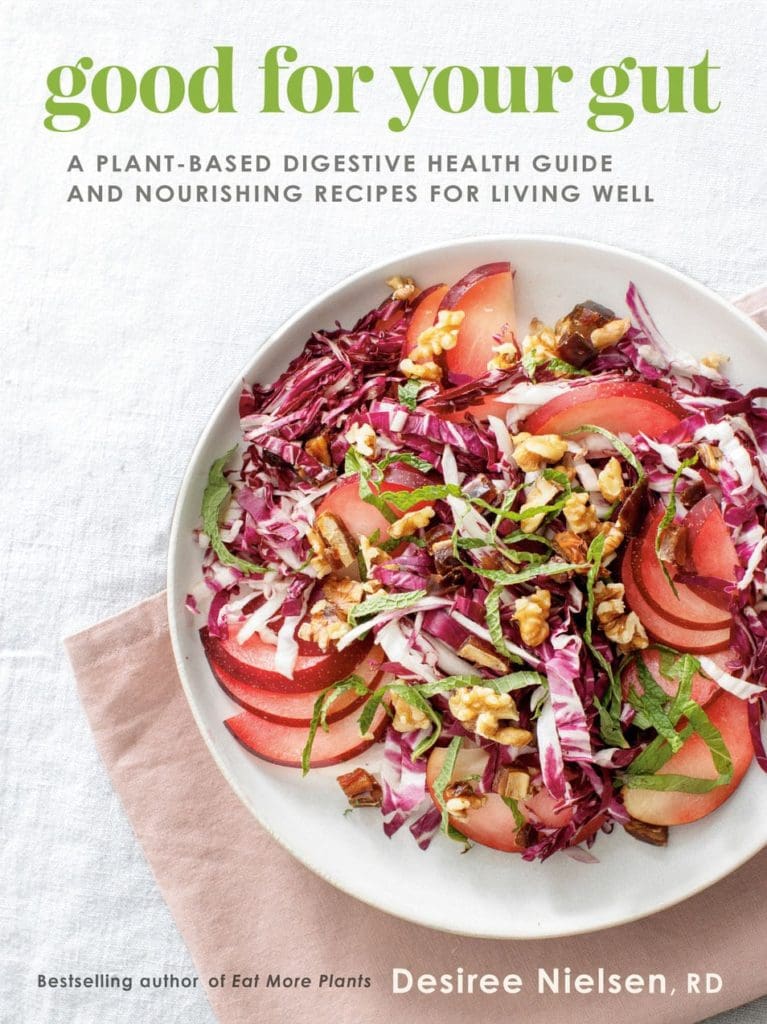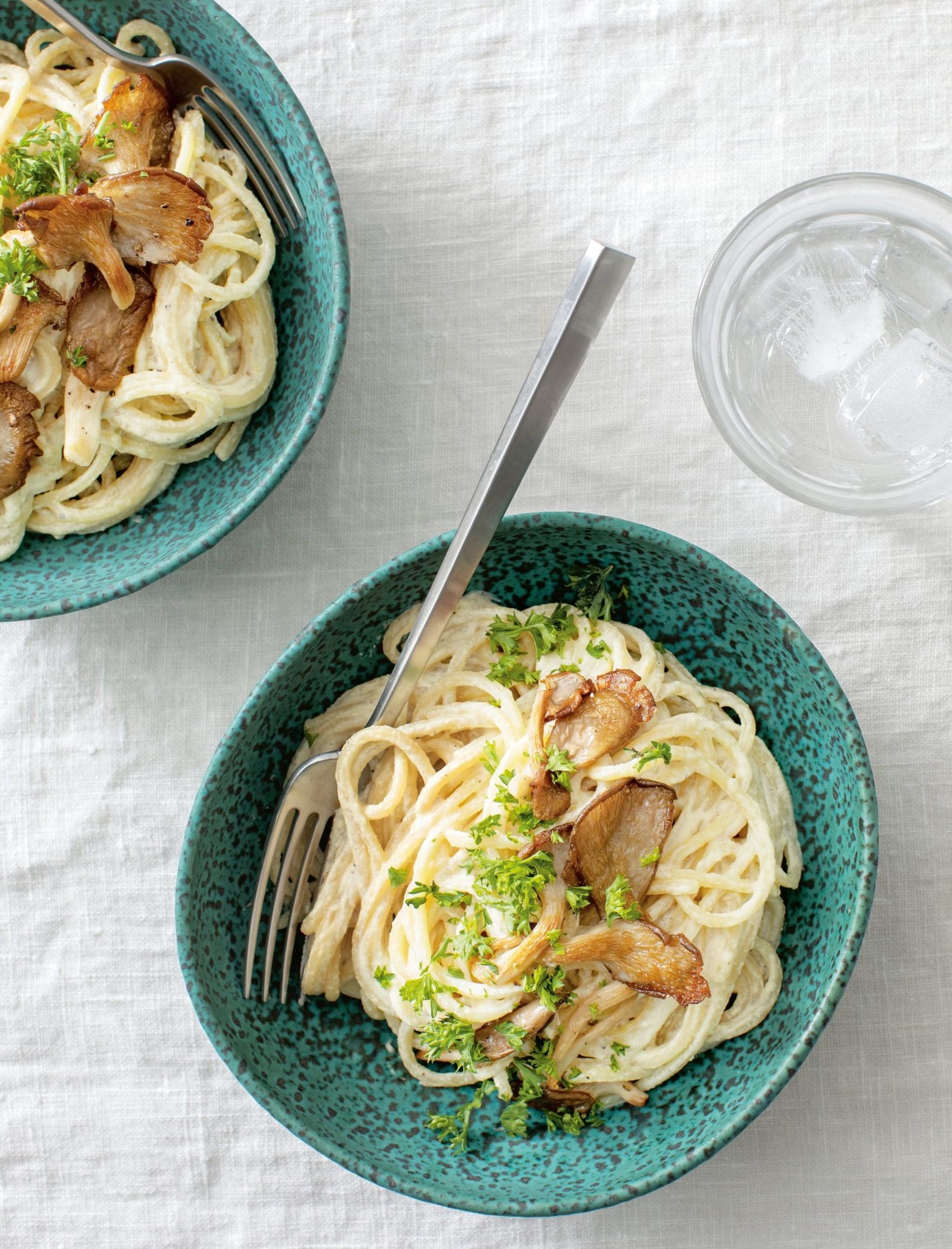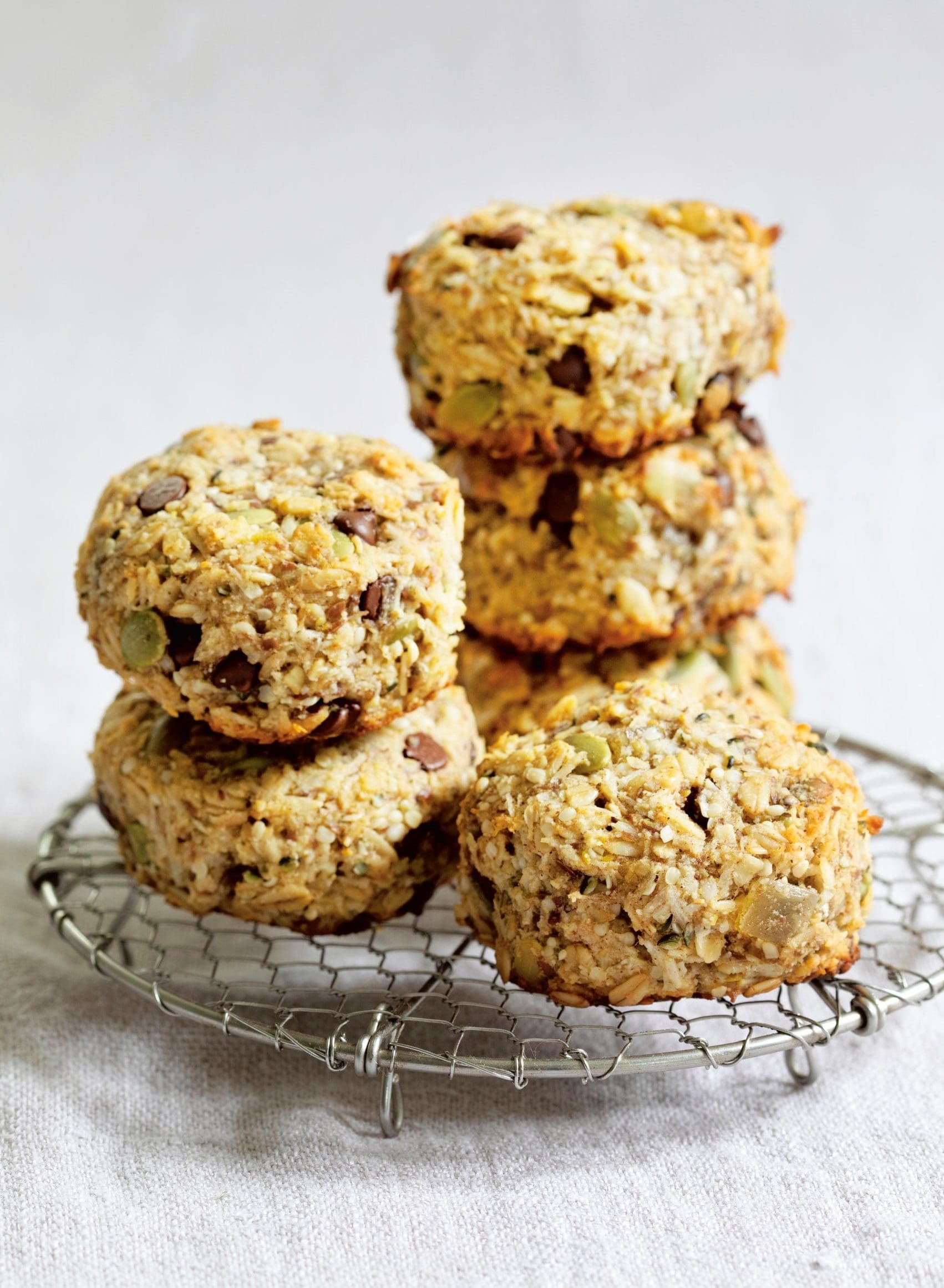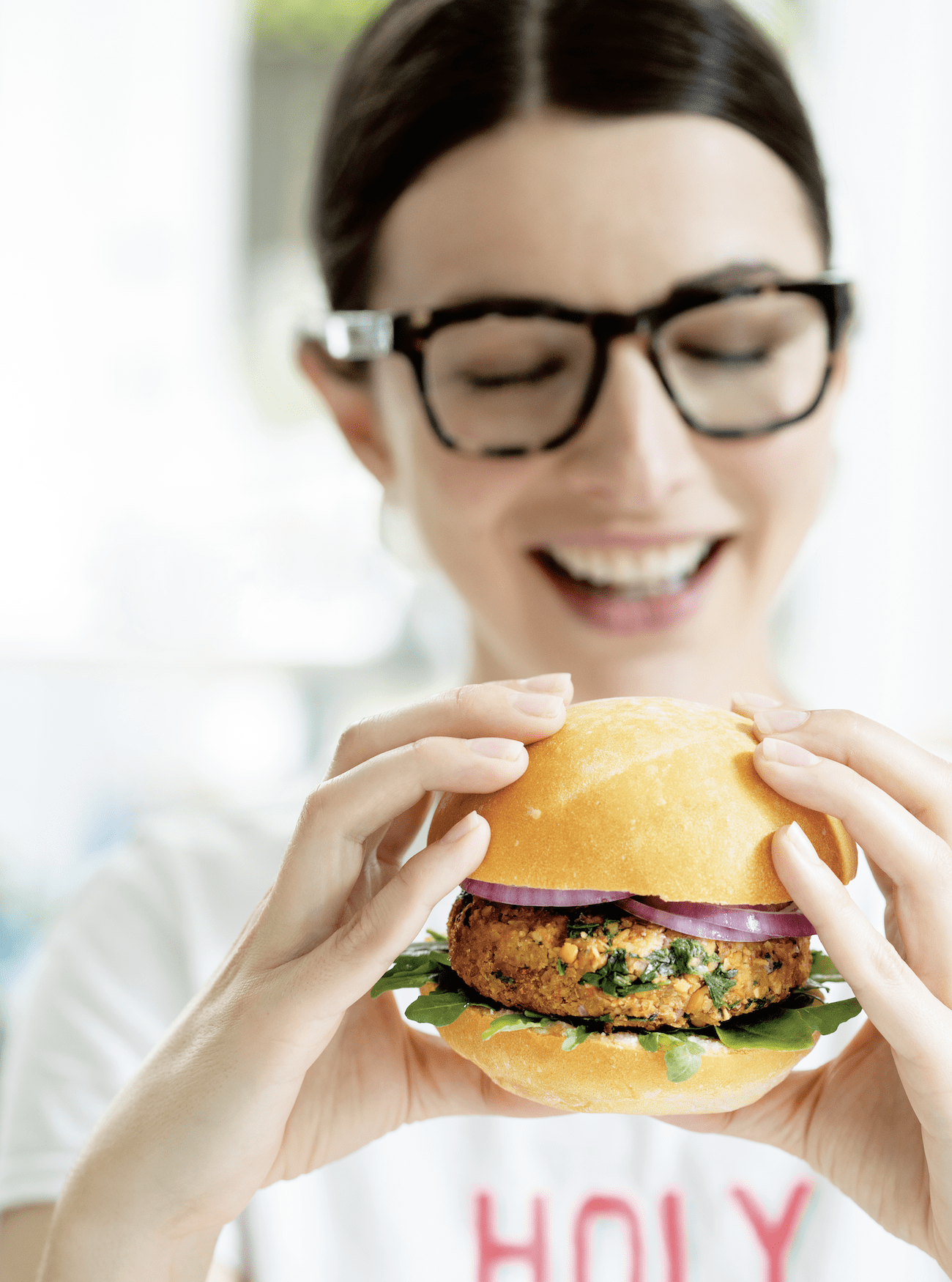Celebrated registered dietician (and our East Van neighbour) Desiree Nielsen is about to release a new cookbook (tomorrow, May 3!) called Good for Your Gut, featuring 90-plus beautifully illustrated plant-based recipes created to protect, heal or soothe your, you guessed it, gut. We chatted with Desiree to learn more! —Noa Nichol

Hi Desiree! Long time no talk! We hear you’ve been busy cooking up a new book, Good for Your Gut; what’s this one all about?
Hiiiiiii Noa! Good For Your Gut helps folks explore all things gut health: from how the gut works, what’s normal, how to eat for better digestive health and what to do when something goes wrong, like irritable bowel syndrome. It also includes over 90 plant-based recipes to help you protect, heal or soothe your gut depending on your needs right now. Our private practice really inspired the approach I took to writing this book. So many people are struggling with their digestive health, but they are also really confused and lack clear evidence-based information on what is happening in their body. So I wanted to help give people the basics of how the gut works because in practice, we always start with education. When you understand more about gut health, it helps you resist the pull of misinformation that is everywhere these days. But education is just the start, we need both concrete solutions to help us tackle our issues as well as the recipes to help take the guesswork out of feeding ourselves on the path to better. The book contains a lot of specific, and actionable advice on what to do to help make things better. And, the recipes are delicious and easy to prepare, no matter what your goals but you’ll notice they are also categorized into one of three groups:
- Protect: recipes high in fibre and/or fermentable carbohydrates, and focused on plant diversity, to help feed the gut microbiome and maintain good digestive health for life
- Heal: low FODMAP recipes for those with irritable bowel syndrome. this section was really important to me as some folks are (incorrectly) told they can’t maintain their plant-based or vegan diet if they get diagnosed with irritable bowel syndrome and it is really hard to find delicious low FODMAP recipes that are plant-based online.
- Soothe: for the most irritated, sensitive guts like those with newly diagnosed celiac disease or a flare of irritable bowel syndrome or inflammatory bowel disease. Sometimes, these folks will think that they will never be able to eat plant foods … which isn’t true! So there are lots of well-cooked and blended options in this chapter to help make these foods easier to digest.
To dig a little deeper, what do you mean when you talk about the gut? Why should we care about our gut health? What are some common everyday gut issues, and what are the foundational principles of good gut health?
When I say the gut, I’m referring to our digestive tract, which is responsible for digesting the food we eat and absorbing its nutrients. That alone cements its importance in human health but the gut also lies at the intersection between immune and nervous system health. Our enteric (gut) nervous system has more nerve cells than our spinal cord! And the nervous system plays a role in how the gut moves, proper digestive secretions and more. And a full 70 per cent of our immune activity is centered within and along our gut … all the while, being home to trillions of bacteria! It’s a complicated system in our body and it is suffering, big time. Our always-on, frazzled nervous systems and our mainly hyper-processed food choices have led to a world where more of us than ever before are suffering from digestive issues. A full 25% of Canadians experience symptoms of constipation at any one time. As many as 18 per cent of Canadians may have irritable bowel syndrome, a condition that is considered a disorder of brain-gut communication (there’s that nervous system piece!) and the rates of inflammatory bowel diseases (Crohn’s and Ulcerative Colitis) are increasing and may reach 1 per cent of the Canadian population very soon. When we talk about gut health, we’re talking about our ability to keep our body well nourished and functioning. We’re talking about our mental health, as there are increased rates of depression and anxiety intertwined with conditions like IBS. We’re talking about our immune function and the development of chronic inflammation and inflammatory diseases. Everyday conditions like gas, bloating and constipation can be more complex than people realize. But there is so much we can do with nutrition to improve them! For example, we have a woefully inadequate intake of fibre in this country and eating enough high fibre plant foods like vegetables, legumes and seeds will help. Exercise helps, as movement begets movement. And drinking enough water is vitally important so that fibre can do its job. Bloating is a bit more complex. It can have a variety of causes, for example, wearing pants that are too tight and sitting all day. It can be caused by stress. Or constipation. Or, it can even be caused by alterations in how we contract our abdominal wall. We often blame food intolerances and start unnecessarily restricting foods that are actually vital for our digestive health. So while something like lactose intolerance can also cause bloating, it’s important we work with a dietitian to get to the root of what’s causing the issue.



It may seem obvious but, from a professional perspective, what’s the connection between what we eat and the health of our gut? What can we eat to protect our gut, and keep it running smoothly?
Everything we eat is in contact with our gut tissues and our microbiome, so our food choices have a direct impact on our digestive wellbeing. For example, if we eat a really high fat diet, we introduce more bile salts into our gut (which our gallbladder releases to help digest fats) and that can shape the gut microbiome. Fibre is critical for encouraging the proper and timely movement of the gut contents, AKA making good poops, but it’s more than that. Insoluble fibre found in the cell walls of plant foods like vegetables help sweep the gut surface, facilitating healthy turnover of the gut barrier. Arabinoxylans found in whole grains are fermented by our gut microbiome to create a short chain fatty acid called butyrate, which helps improve immune system function and feed the gut cells. Without a doubt, the most important thing we can all do is to eat more whole plant foods: fruits, vegetables, legumes, whole grains, nuts and seeds. If you don’t have any preexisting gut conditions, it really is that simple. These foods are high in fibre and protective phytonutrients that help the gut-brain-immune axis to function optimally. But you can’t go from zero to 60 overnight. You need to train your gut for plant life the same way you train your legs for a half marathon. Slowly and consistently over time. Add a serving of lentils to your lunch time salad. Let your gut get used to it. Then, start making high fibre berry smoothies for breakfast, or doubling up on vegetables at dinner.
What’s the gut-brain connection, and how do we nurture it?
Our gut is heavily innervated, and the enteric nervous system is critical to proper digestive function … and vice versa. We see this in irritable bowel syndrome, where there is a much higher risk of depression and anxiety. Part of that has to do with the distressing nature of the condition but brain-gut communication in the condition also plays a role. Stress can have an impact on digestive function. On an everyday level, digestion is optimized when we are in our “rest and digest” state, or parasympathetic nervous system function. But so many of us are in ‘fight or flight’ all the time because we are always on thanks to work from home, digital living and we’re super stressed out. We know that stress can cause changes in the movement of the gut, leading to bloating and constipation. It can even cause a flare of irritable bowel syndrome or Crohn’s disease! While I would love to say that nutrition is 100 per cent of gut health, we cannot properly care for our gut without addressing our nervous system. This means non-negotiable time everyday for managing the effects of stress on our body. Whether that is a walk outside, deep breathing, social time (screen free) or even a hot bath. It also means nurturing the health of the gut itself, as roughly 80 per cent of the communication between the gut and the brain is actually coming from the gut TO the brain. Most of the serotonin produced in our body is produced in our gut-based nervous system. Our gut microbiome can alter the production of neurotransmitters! So eating your plants, getting your intake of fibre up and fostering a healthy gut microbiome is a smart move.
What’s FODMAP, how is it related to gut health and what are some anti-inflammatory plant-based foods and lifestyle strategies that we can put into practice if/when we’re suffering from gut issues?
FODMAPs are fermentable oligo-, di- and monosaccharides and polyols. In short? Carbohydrates that YOU cannot digest and absorb so they remain in the gut and can be fermented by the gut bacteria living in your colon. For most of us, this is a very good thing. Our healthiest foods are high in FODMAPs, like chickpeas, apples and beets. Alongside these beneficial foods, incorporating healthy nut butter into your diet can also promote better gut health. Nut butters offer a creamy source of healthy fats and proteins while being high in fiber—perfect for supporting the digestive system. We want to feed our gut microbes so they can help support our gut! But for those with irritable bowel syndrome, eating more FODMAPs than are tolerated can make symptoms like loose stools, gas and pain worse. FODMAPs don’t cause IBS, they merely exacerbate symptoms. A temporary low FODMAP diet is an evidence-based tool to help us calm our symptoms while we learn which foods (and in what amounts) are triggers for us specifically.
What sorts of recipes can we look forward to making from this book? Do you have a favourite?
I hope the recipes in this book bust misconceptions of what nutrient-dense, plant-based cooking looks like. I need flavour. I want to LOVE what I eat! I don’t think that healthy and delicious are mutually exclusive. And yes, that includes dessert. Like my take on a millionaire shortbread, with an almond flour cookie base and peanut butter date caramel. Or a low FODMAP cacio e pepe pasta that tastes creamy, cheesy and garlicky even though the recipe contains none of those ingredients! I’ve also continued experimenting with breakfast cookies—because who doesn’t like a nice cookie with a cup of coffee in the morning—and think that the version in Good For Your Gut might just be my best yet!
desireerd.com

Be the first to comment